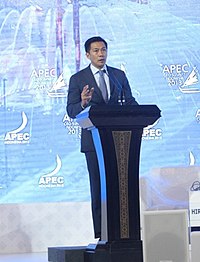
Photo from wikipedia
ABSTRACT Drawing upon the Job Demands-Resources (JD-R) model, this study tests an integrated theoretical framework in which paradoxical leader behaviour (PLB) is theorized to hinder and motivate employee creativity through… Click to show full abstract
ABSTRACT Drawing upon the Job Demands-Resources (JD-R) model, this study tests an integrated theoretical framework in which paradoxical leader behaviour (PLB) is theorized to hinder and motivate employee creativity through role ambiguity and creative self-efficacy. The moderating effects of job complexity and cognitive flexibility on the above effects are also investigated. The 317 samples collected from the three-wave survey in China demonstrate that in the hindering process, PLB attenuates employee creativity via role ambiguity, and in the motivating process, PLB increases employee creativity via creative self-efficacy. Furthermore, cognitive flexibility and job complexity can magnify the positive impact of PLB on employee creativity via creative self-efficacy, while cognitive flexibility can buffer the negative impact of PLB on employee creativity via role ambiguity.
Journal Title: Asia Pacific Business Review
Year Published: 2022
Link to full text (if available)
Share on Social Media: Sign Up to like & get
recommendations!